Moisture Meter Buying Overview: What to Look for in High-Quality Instruments
Moisture Meter Buying Overview: What to Look for in High-Quality Instruments
Blog Article
The Ultimate Overview to Wetness Meters: A Comprehensive Overview and Just How They Can Conserve You Cash
In the realm of structure maintenance, building, and numerous industries, the significance of accurately gauging wetness degrees can not be overemphasized. Dampness meters work as crucial devices in finding and keeping track of moisture web content in materials, aiding in preventing pricey damages and guaranteeing the high quality of items. Comprehending the subtleties of various sorts of dampness meters, their applications, and the possible cost-saving advantages they use can be a game-changer for professionals and businesses alike. Discovering exactly how these tools can not just simplify procedures however likewise contribute to financial savings is a trip worth starting.
Sorts Of Dampness Meters
One typical type is the pin-type wetness meter, which measures the electrical resistance in between 2 pins inserted into a material. Pinless dampness meters, on the various other hand, use electromagnetic sensor plates to scan a larger area without causing damage to the material's surface area.

Furthermore, there are likewise specialty wetness meters designed for particular products like grain, soil, or hay. These meters offer exact wetness analyses customized to the unique homes of the product being examined. Infrared moisture meters determine the thermal buildings of a product to identify its moisture web content non-invasively, making them useful for applications where pin or pinless meters might not be appropriate. Comprehending the different sorts of moisture meters readily available can assist markets pick the most ideal tool for their certain wetness dimension requirements.

Benefits of Making Use Of Dampness Meters
Moisture meters use invaluable benefits in accurately checking and evaluating dampness levels in diverse materials and environments. One of the key advantages of making use of wetness meters is the avoidance of possible damages caused by excess dampness.
Moreover, utilizing wetness meters can bring about raised power effectiveness. By recognizing areas with high wetness levels, such as leakages or poor insulation, modifications can be made to enhance power conservation and decrease energy costs. In agricultural setups, wetness meters play an important role in maximizing crop yields by allowing farmers to monitor dirt wetness degrees and make informed irrigation decisions. On the whole, the advantages of utilizing wetness meters cover throughout various markets, giving affordable options and advertising much better quality assurance techniques.
How to Pick the Right Dampness Meter
When selecting a dampness meter, it's important to guarantee that the meter is appropriate for the specific material you will be testing. Different products have varying electric properties that can influence dampness analyses, so picking a meter made for your material is vital for accurate results. By carefully examining these factors, you can select a moisture meter that meets your requirements and gives precise wetness measurements for your projects.
Correct Methods for Dampness Meter Use

Cost Savings Via Wetness Meter Applications
Exactly how can the tactical usage of wetness meters lead to significant price savings throughout numerous sectors? In the agriculture sector, dampness meters aid in identifying the ideal time for gathering plants, preventing over-drying or excess wetness that can affect the final product's quality.
In a similar way, in building and construction, dampness meters assist protect against expensive damages by finding wetness levels in building products, such as timber or concrete, which can cause architectural issues otherwise addressed without delay. By determining trouble locations early, specialists can take corrective measures to stay clear of substantial repair services or replacements, eventually conserving time and cash.
Additionally, in the food handling industry, moisture meters are necessary for keeping an eye on item quality and making certain conformity with security regulations. By accurately determining dampness web content in foodstuff, makers can protect against perishing, preserve freshness, and decrease waste, causing substantial expense financial savings. On the whole, the critical application of dampness meters is a useful financial investment that can bring about substantial expense decreases and enhanced effectiveness across various sectors.
Verdict
Finally, wetness meters are beneficial tools for discovering and measuring wetness degrees in different products. By making use of the ideal moisture meter and adhering to correct strategies, individuals can successfully stop pricey damages triggered by excess moisture. Buying a top quality moisture meter can result in significant expense financial savings in the lengthy run by determining potential problems early and allowing prompt remediation. Inevitably, dampness meters are important instruments for useful content preserving the honesty and durability of frameworks and materials.
Wetness meters serve as crucial devices in spotting and keeping track of moisture content in products, assisting in protecting against pricey damages and ensuring the high quality of items. Infrared moisture meters determine the thermal residential or commercial properties of a product to identify its moisture material non-invasively, making them helpful for applications where pin or pinless meters may not be ideal.Moisture meters use vital advantages in accurately keeping track of and assessing dampness levels in diverse materials and atmospheres. In farming setups, dampness meters play an essential function in enhancing crop yields by making it possible for farmers to check Learn More Here soil moisture degrees and make notified irrigation decisions.In final thought, dampness meters are useful devices for gauging and finding dampness levels in different products.
Report this page